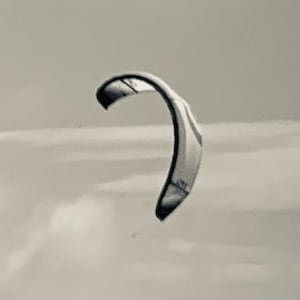wind at one’s back: Idiom Meaning and Origin
What does ‘wind at one's back’ mean?
The idiom "wind at one's back" refers to a favorable situation or circumstance that helps someone move forward or achieve success more easily.

Idiom Explorer
The idiom "wind off" means to gradually relax or unwind from a stressful or intense situation. It refers to the action of releasing tension or pressure, much like winding off a tightly wound object.
The idiom "wind back the clock" means to go back to a previous time or to reverse the effects of time in order to recreate a past situation or feeling.
The idiom "which way the wind is blowing" means to be aware of current trends or popular opinions in order to adapt or make decisions accordingly.
The idiom "upper hand" refers to having an advantage or being in control of a situation. It implies having more power, influence, or authority over others.
The idiom "ride the wave" means to go along with or take advantage of a favorable situation or trend. It implies adapting to the circumstances and enjoying the success or benefits that come from it.
"On the up" is an idiom that indicates a positive change or improvement in a situation or someone's fortunes.
The idiom "one step ahead" means being in a position of advantage or being more prepared than others in a given situation.
Invisible Propulsion
The idiom "wind at one's back" is a common phrase in the English language. It is used to describe a favorable or advantageous situation or circumstance that gives someone an extra boost or advantage in achieving their goals or objectives.
The origins of this idiom can be traced back to the nautical world. Sailors are well aware of the importance of wind direction when sailing, as it plays a crucial role in the efficiency and speed of their journey. When the wind is blowing directly behind a sailing vessel, it fills the sails and propels the boat forward, making the journey easier and faster. This is known as having the "wind at one's back."
The idiom "which way the wind is blowing" is closely related to having the "wind at one's back." It refers to being aware of the current trends or popular opinions in a particular field or context. Just as sailors need to know which way the wind is blowing to navigate effectively, individuals or groups in various domains need to stay informed about the prevailing ideas or attitudes to make informed decisions and adapt to their surroundings.
Over time, the phrase has come to be used figuratively to describe situations in which individuals or groups experience similar advantages or tailwinds in their pursuits. It signifies the presence of external forces or circumstances that work in their favor, making their efforts less arduous and more productive.
When someone has the "wind at their back," it implies that they are being propelled forward by external forces, such as favorable market conditions, supportive relationships, or a stroke of luck. It suggests that they are in a position of advantage or momentum that increases their chances of success.
The idiom "on the back of" can be used in conjunction with having the "wind at one's back." It means building upon a previous success or advantage to achieve further accomplishments. When individuals or groups experience success or favorable circumstances, they can leverage those achievements or advantages to continue progressing and reaching new heights. It is like riding on the back of a previous success, using it as a foundation for future endeavors.
The idiom can be applied in various contexts, including sports, business, and personal endeavors. For instance, in the sporting world, athletes may talk about having the "wind at their back" when they feel a surge of energy or when external factors, such as crowd support, contribute to their performance. They may also speak of "which way the wind is blowing" to stay ahead of their competitors and make strategic decisions based on current trends.
Similarly, in business, entrepreneurs or companies may attribute their success to having the "wind at their back" when they benefit from favorable economic conditions or industry trends. They may also capitalize "on the back of" previous successes by expanding their product lines or entering new markets based on their established reputation.
It is worth noting that having the "wind at one's back" does not guarantee success. While it may provide an advantage, it is still up to the individual to capitalize on the favorable circumstances and take appropriate action to achieve their goals. Additionally, this idiom does not imply that individuals are solely reliant on external forces; it simply acknowledges the presence of advantageous conditions.
The idiom "have time on one's side" relates to having the "wind at one's back." When individuals have time on their side, it means they have a favorable or advantageous amount of time to accomplish their goals or objectives. This can be beneficial in the sense that they can plan and strategize effectively, make informed decisions, and take the necessary steps to achieve success. It adds an element of patience and timing to the advantage provided by having the "wind at one's back."
The idiom "have time on one's side" is particularly important in long-term endeavors, such as investment strategies, career progressions, or personal goals. If individuals have enough time to work towards their objectives, they can navigate obstacles, learn from their experiences, and adjust their approach as needed. Time becomes a valuable asset, working in conjunction with the advantage of having the "wind at one's back."
The idiom "wind at one's back" captures the idea of experiencing favorable circumstances or external forces that contribute to an individual or group's success. It originated from the nautical world and has found its way into everyday language. While it signifies a position of advantage, it does not guarantee success and should be seen as an opportunity rather than a guarantee. This idiom serves as a reminder that external forces may provide a boost, but it is ultimately up to the individual to navigate their own path.
Example usage
Examples of how the idiom "wind at one's back" can be used in a sentence:
- After months of hard work, Sarah finally had the wind at her back and successfully completed her project.
- Jackson's business started to thrive once he had the wind at his back and secured a major investor.
- With the wind at their back, the team confidently tackled the difficult challenge and emerged victorious.
More "Nautical" idioms



